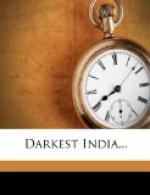There is little of the form, though there may be much of the spirit, of the Salvation Army in General Booth’s “Darkest England and the Way Out.” It is on the whole a sober, and in some respects well-reasoned, attempt to solve the most urgent problem of the day. Whosesoever the actual workmanship of the book may be, the personality of General Booth pervades every page—nowhere obtrusively it is true, but sufficiently to impart life and warmth to the discussion of a problem whose solution, though it must be sought for only within the limits marked out by economic principles, will never be found, unless it is sought for with a certain passionate sympathy for the outcast. The dramatic parallel which the writer establishes between the savagery of Darkest Africa and the suffering and sin of Darkest England, will arrest attention, and will of itself make the book popular. Here, however, we are concerned with the more matter-of-fact elements in the problem, and with the practical remedies which are proposed for it. The heading of “the Submerged Tenth” which is given to one of the chapters, roughly indicates the dimensions of the task that has to be performed. General Booth takes three millions to be the strength of the army of the destitute in England. The total comprises the representatives of every phase of want—criminals and drunkards and idlers and their dependants, as well as the class who are destitute through misfortune, who are honest in their poverty, and whom no man can blame for it. For these last-named, society does next to nothing. There is the workhouse for people who have spent their last penny; for so long as it remains unspent, it is a legal disqualification for the help of the State. Or there is the casual ward, where a hard task is exacted in payment for hard fare, but where absolutely nothing is done to help the wayfarer to gain or regain a place and a living in society. Out-relief has been reduced to the minimum. A few weeks ago the whole parish of St. Jude, Whitechapel, with a population of sixty thousand, provided only four applicants to the Board of Guardians for out-relief. Thus far the organized official agency has done little enough for the raising of the “submerged tenth.” If laissez faire were a cure for all the ills of society, they would have been cured long ago, for the remedy has been applied with a persistency that has failed not. General Booth thinks that he has discovered a more excellent way, and is entitled to a hearing for his plan, for part of it is already in operation. In the “shelters” established by the Salvation Army in the east of London, casual relief is given on almost as large a scale as in the casual wards of the London Workhouses; but he claims for it that it is a less degrading form of help, that sympathy goes with it; and with him of course the emotional accompaniments which the Salvation Army is careful to provide, count for much.
The “Christian” prognosticates a good future for the Scheme.




